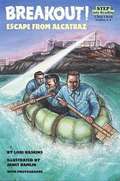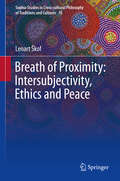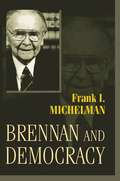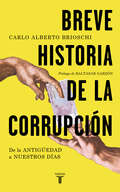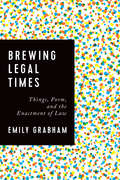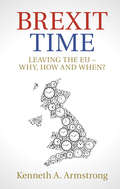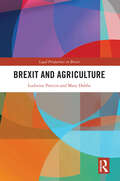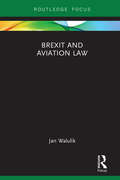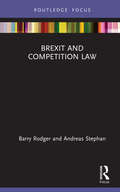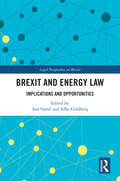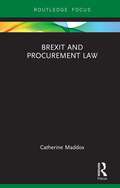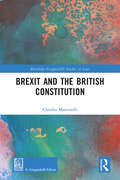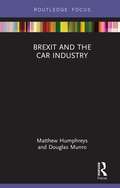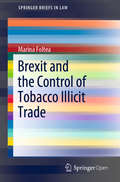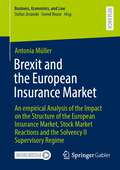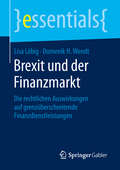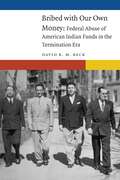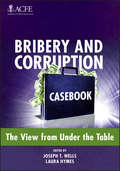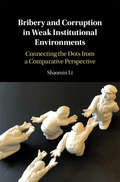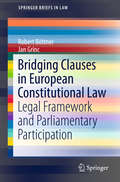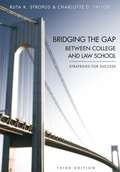- Table View
- List View
Breaking the Silence: French Women's Voices from the Ghetto
by Fadela Amara Sylvia Zappi Helen Harden Chenut<p>Born in France of Algerian parents, Fadela Amara is a human rights activist who speaks with both a personal and a collective voice. This book is a passionate account of her struggle to found the movement called “Ni Putes Ni Soumises” (Neither Whore Nor Submissive), aimed at shattering the law of silence about violence against women within French suburban communities. The questions Amara raises are part of a broader agenda to open contemporary French society to greater ethnic and cultural diversity. These issues also pose problems of national identity and the defense of secularism for the state. <p>As France increasingly confronts such tensions and the emergence of Islamic movements, French cities face problems of unemployment, racial and ethnic discrimination, and violence. Amara's eloquent call for social and gender equality underscores a host of interconnected issues, including France's colonial past and the degradation of the suburbs into ghettos that have progressively marginalized immigrant and working-class communities. Amara and her co-workers have challenged the French Republic's leaders using a strategy that champions republican secular values and stresses the language of universalism to advance individual rights. Women's rights are human rights, they argue, thus casting their demands for equality in terms of a broader struggle for democratic freedoms. Moving, candid, and timely, Breaking the Silence created a sensation when it was published in France. Fadela Amara is currently State Minister for Urban Affairs, charged with the rehabilitation of the very ghettos she describes.</p>
Breaking the Vicious Circle: Toward Effective Risk Regulation
by Stephen BreyerReprinted lectures and thoughts from a United States Supreme Court justice.
Breakout! Escape from Alcatraz
by Lorie HaskinsThree men make their own life jackets and boat in preparation for their escape from Alcatraz. That isn't all they had to do, either! This is an exciting adventure story. The convicts escaped, but did they make it to land? This is a fine book for a book report. This file should make an excellent embossed braille copy.
Breath of Proximity: Intersubjectivity, Ethics And Peace (Sophia Studies in Cross-cultural Philosophy of Traditions and Cultures #10)
by Lenart ŠkofThis book offers an original contribution towards a new theory of intersubjectivity which places ethics of breath, hospitality and non-violence in the forefront. Emphasizing Indian philosophy and religion (Vedas and Upanishads) and related cross-cultural interpretations, it provides new intercultural interpretations of key Western concepts which traditionally were developed and followed in the vein of re-conceptualizations or revitalizations of Greek thought, as in Nietzsche and Heidegger, for example. The significance of the book lies in its establishment of a new platform for thinking philosophically about intersubjectivity, so as to nudge contemporary philosophy towards a more sensitive approach, which is needed in our times. Its originality lies in its innovative approach, which searches for the origin of ethical gestures (represented in respecting the breath/breathing) through the newly introduced concept of "mesocosm" as a space of a ritual, or a new ethical space of intersubjective encounters. The book also introduces the possibility of an original ethics based on breath. Intended for philosophers, feminists and others concerned with intercultural philosophy and comparative religion, the book will appeal to readers interested in contemporary ethical and political theories of peaceful conflict resolution and concepts of hospitality. A Breath of Hospitality will benefit all who seek a more sensitive approach in philosophy, including philosophy of religion, and often-neglected practical and educational layers of our everyday intersubjective relations.
Brennan and Democracy
by Frank I. MichelmanIn Brennan and Democracy, a leading thinker in U.S. constitutional law offers some powerful reflections on the idea of "constitutional democracy," a concept in which many have seen the makings of paradox. Here Frank Michelman explores the apparently conflicting commitments of a democratic governmental system where key aspects of such important social issues as affirmative action, campaign finance reform, and abortion rights are settled not by a legislative vote but by the decisions of unelected judges. Can we--or should we--embrace the values of democracy together with constitutionalism, judicial supervision, and the rule of law? To answer this question, Michelman calls into service the judicial career of Supreme Court Justice William Brennan, the country's model "activist" judge for the past forty years. Michelman draws on Brennan's record and writings to suggest how the Justice himself might have understood the judiciary's role in the simultaneous promotion of both democratic and constitutional government. The first chapter prompts us to reflect on how tough and delicate an act it is for the members of a society to attempt living together as a people devoted to self-government. The second chapter seeks to renew our appreciation for democratic liberal political ideals, and includes an extensive treatment of Brennan's judicial opinions, which places them in relation to opposing communitarian and libertarian positions. Michelman also draws on the views of two other prominent constitutional theorists, Robert Post and Ronald Dworkin, to build a provocative discussion of whether democracy is best conceived as a "procedural" or a "substantive" ideal.
Breve historia de la corrupción: De la Antigüedad a nuestros días
by Carlo Alberto Brioschi«Una lectura deliciosa, purificante e imprescindible para todo aquel que quiera levantar la cabeza y contemplar -desde una perspectiva más erudita- la poza de mierda en la que chapotean muchos de nuestros egregios conciudadanos.»Quim Monzó, La Vanguardia Políticos, gobernantes, empresarios de cualquier ralea: todos han encontrado en su camino el sutil y penetrante hedor de la corrupción, desde la antigua civilización mesopotámica, donde la reciprocidad regalo-favor era una costumbre consolidada, hasta las irresueltas cuestiones morales de nuestros días. Al final del recorrido, es lamentable comprobar, como destaca Garzón en su contundente prólogo, que «tampoco han cambiado tanto las cosas; en España y fuera de España se mercadea con los cargos públicos, se aceptan regalos e incluso se defiende vehementemente que éstos son una costumbre social». Esta erudita, divertida y breve historia traza las «proezas corruptivas» de los grandes y menos grandes personajes de la historia, con especial hincapié en los gobernantes, los políticos, los funcionarios públicos y los numerosos estafadores financieros a lo largo de cuatro mil años. Reseña:«La narración breve y concisa es un arte, un don que Brioschi posee y utiliza en este brillante libro.»Roberto Coalda, Il Sole 24 Ore
Brewing Legal Times: Things, Form, and the Enactment of Law
by Emily GrabhamMuch socio-legal scholarship assumes that even if experiences of law and time differ, people and laws exist within an overarching, shared timeframe. In Brewing Legal Times, Emily Grabham boldly departs from this assumption, drawing on perspectives from actor-network theory, feminist theory, and legal anthropology to advance our understanding of law and time. Grabham argues that human, material, and legal relationships constantly generate new temporalities because of human and nonhuman interactions. By engaging with the creative potential of "things" such as cells, viruses, reports, legal documents, and more, our understanding of law and time is subject to change. In challenging the scholarship on the materiality of time and law, Brewing Legal Times encourages us to confront the multiple and mundane ways in which time is enacted through legal networks.
Brexit Time: Leaving the EU - Why, How and When?
by Kenneth A. ArmstrongThe result of the UK referendum in June 2016 on membership of the European Union had immediate repercussions across the UK, the EU and internationally. As the dust begins to settle, attention is now naturally drawn to understanding why this momentous decision came about and how and when the UK will leave the EU. What are the options for the new legal settlements between the UK and the EU? What will happen to our current political landscape within the UK in the time up to and including its exit from the EU? What about legal and political life after Brexit? Within a series of short essays, Brexit Time explores and contextualises each stage of Brexit in turn: pre-referendum; the result; the process of withdrawal; rethinking EU relations; and post-Brexit. During a time of intense speculation and commentary, this book offers an indispensable guide to the key issues surrounding a historic event and its uncertain aftermath.
Brexit and Agriculture (Legal Perspectives on Brexit)
by Ludivine Petetin Mary DobbsAcknowledging the challenges and opportunities raised by Brexit for the agri-food supply chain and agricultural policies across the UK, this book provides the first in-depth analysis of agricultural policy developments across the UK’s four nations rooted in strong theoretical and practical underpinnings. Arguing that the four nations could be more ambitious in departing from the Common Agricultural Policy and extending beyond the ‘public money for public goods’ approach adopted across the UK, it critiques the core attributes of their policies with focuses including the debate over outcome-based schemes, governance mechanisms, impacts on farm diversity and path dependency on the Common Agricultural Policy and English approaches. It promotes a ‘resilient agriculture’ paradigm and utilises social-ecological services, net zero, agroecology and agri-food democracy as the main pathways to achieve this. In doing so, it scrutinises the evolving contextual, political and legal landscape within which devolved and UK agricultural policies are developing from a multilevel governance perspective, examining the implications of WTO law for the UK and its devolved administrations to determine environmental, food and animal welfare standards under the GATT, the SPS and TBT Agreements and financial support schemes under the Agreement on Agriculture. The book assesses the significance of the Northern Ireland Protocol, the Trade and Cooperation Agreement with the EU and other free trade agreements for standards across the UK and access to markets. From a domestic perspective, challenges to devolution and the stability of the Union are highlighted. Elements of unilateral recentralisation are visible via financing mechanisms, the UK Internal Market Act and the Agriculture Act. The book’s interdisciplinary nature makes it of interest to lawyers, political scientists, economists, human geographers and scientists, as well as policy-makers, agricultural communities, civil society organisations and think tanks in the devolved administrations, the UK, the EU and beyond.
Brexit and Aviation Law (Legal Perspectives on Brexit)
by Jan WalulikFocusing on the consequences of Brexit for aviation law, this book presents the key legal issues for aviation business and administration, as well as all major stakeholders that could potentially be affected by Brexit. This will include airlines, airports, aerospace manufacturers, regulatory and judicial institutions, passengers and employees. The book will indicate groups of legal acts disturbed by Brexit and those few that will remain untouched, and develop on this basis a digest of regulatory and institutional problems that will arise in various areas of the discussed sector. Finally, the short title will deliberate on the directions of possible actions which may be undertaken to avoid post-Brexit legal incoherence. This review should give essential guidance to the industry and the authorities on both sides of the English Channel as to what to expect and how to prepare for the forthcoming legal earthquake.
Brexit and Competition Law (Legal Perspectives on Brexit)
by Barry Rodger Andreas StephanThis book provides the first comprehensive analysis of the immediate and likely longer-term consequences of Brexit for the UK’s competition law regime and includes the competition and subsidy control provisions of the EU-UK Trade and Cooperation Agreement. It has been written to be of value to scholars and practitioners of competition law, whilst also providing a useful guide to readers with only limited understanding of competition rules. The book provides a detailed critical discussion of how Brexit impacts on five key aspects of competition policy in the UK: legislation, institutions and cooperation; antitrust rules that prohibit anti-competitive agreements and the abuse of a dominant position; private enforcement, in particular actions for damages; regulation of mergers and acquisitions; and State aid or subsidy control rules.
Brexit and Energy Law: Implications and Opportunities (Legal Perspectives on Brexit)
by Ana Stanič and Silke GoldbergBringing together leading experts from across the UK and Europe, this book provides a comprehensive analysis of the impact of Brexit on the energy sector in the UK and in the European Union and its Member States. In recent decades, the trend within the EU has been towards greater integration and liberalisation of energy markets. Through the development of the Union’s internal energy market and the funding of cross-border energy infrastructure, EU membership facilitates cross-border trade in energy, promotes security of energy supply, and, via the European Atomic Energy Community (Euratom), allows EU Member States to trade in nuclear material for energy production. Brexit changes all of this. The significant level of integration and interdependence in EU energy policy means that the UK’s departure from the Union poses many challenges for the UK, the EU, and EU Member States. While certain energy-related arrangements have been addressed, the relationship between the UK and EU in the energy sector has been changed fundamentally. In this context, important and interrelated questions arise, such as the following: Under what terms will energy trading between the EU and UK now take place? What access will the UK have to EU energy markets? What does Brexit mean for the security of energy supply? What does the UK’s departure from Euratom mean for nuclear research? Can the crossborder single energy market (SEM) on the island of Ireland continue following Brexit? What implications does Brexit have for renewables, the environment, and climate change? Brexit comes at a time when the European energy sector is undergoing the processes of decarbonisation and energy transition. This book offers researchers, legal practitioners, and policy advisers in-depth understanding of the interplay between these challenges and Brexit.
Brexit and Procurement Law (Legal Perspectives on Brexit)
by Catherine MaddoxPublic procurement law, regulating public sector purchasing of certain contracts for goods, works and services, is an area of EU law which is closely intertwined with the UK's economy. It will almost inevitably be affected by the consequences of Brexit. At a time of significant uncertainty, this book explores policy directions which domestic procurement law could take in the future, including whether 'Buy National' policies might feasibly be introduced, or whether existing procurement procedures could be significantly reviewed.
Brexit and the British Constitution (Routledge-Giappichelli Studies in Law)
by Claudio MartinelliThis book explores how and why the UK left the European Union and its impact on the British Constitution. The British people voted to leave the European Union in 2016, decreeing a passage of historical significance with deep political and legalimplications, as well as socioeconomic and geo-strategic consequences yet to be defined. The work explores the roots behind that decision, examining the political and legal steps that led to Brexit and analysing the consequences and prospects for the United Kingdom. It considers the ways that the British Constitution has faced the test of Brexit, and its constitutional, political and socioeconomic implications. It further examines the ways in which these implications interact in order to reconstruct a coherent and real constitutional framework. The book will be of interest to scholars and students in the fields of Constitutional Law, European Union Law, Political Science, Contemporary History, and International Trade.
Brexit and the Car Industry (Legal Perspectives on Brexit)
by Matthew Humphreys Doug MunroOne of the principal arguments put forth by Brexit supporters is that by freeing the UK from the stranglehold of EU law, the country will be able to expand its markets through increased bilateral trade and enhance economic growth. This book tests this proposition by reference to the car industry. Brexit and the Car Industry explores the international position of the car market to argue that the hope of Brexit bringing regulatory freedom is illusory. The book starts by examining the structure of the vehicle industry, how its regulatory framework evolved and how the environment in which it operates is constrained by international standards and the practicalities associated with trading across different regulatory systems. By examining the evolution of vehicle regulations, particularly related to the environment, it argues that a UK independent path is not only impractical but self-defeating. The private car market is structured in such a way that is global, and meeting the various international regulatory requirements is a price of entry requirement which no bilateral trade agreements are likely to alter. The book also considers changing environment affecting the car industry in the context of an aspiration for regulatory freedom. The response to climate change and the impact of technological change – specifically driverless vehicles – are big questions for the industry and both are examined in this book. The book also considers the emergence of large metropolitan areas imposing their own use and environmental requirements operating separately to national standards. The future of electric and autonomous vehicles combined with the complexity of the regulatory environment with both international and localised pollution measures make the UK navigating a safe independent path through with a viable car industry highly questionable. Providing a comprehensive review of the relationship between regulatory frameworks and free trading models, this book is aimed at industry and legal professionals. It will also be of interest to students studying market behaviour, free trade law and the free movement of goods, and environmental protection.
Brexit and the Control of Tobacco Illicit Trade (SpringerBriefs in Law)
by Marina FolteaThis book assesses the consequences of Brexit for the control of illicit trade in tobacco products in the UK and EU. Based on the currently applicable legal framework, it examines the significance of a possible non-application of the acquis communautaire in the UK in matters relating to anti-illicit trade in tobacco legislation. It also analyses the modes of future cooperation between the UK and the EU in this area, as well as possible regulatory scenarios and their consequences. The book comprises six main sections. After the introduction (Section 1), Section 2 discusses the state of play of Brexit and possible outcomes of Article 50 of the Treaty of European Union procedure. Section 3 illustrates the data and trends of illicit tobacco trade in the UK. Section 4 describes the relevant legal (e.g. trade and fiscal measures) and enforcement frameworks in the UK and suggests possible post-Brexit scenarios in control of tobacco illicit trade. Section 5 focuses on the relevance of arrangements between governments and the tobacco industry in the control of illicit trade. Section 6 then analyses the relevance of key EU and global anti-illicit trade initiatives. Lastly, Section 7 the book offers some recommendations and conclusions on how the UK could control illicit trade in tobacco after Brexit.
Brexit and the European Insurance Market: An empirical Analysis of the Impact on the Structure of the European Insurance Market, Stock Market Reactions and the Solvency II Supervisory Regime (Business, Economics, and Law)
by Antonia MüllerWith the Brexit referendum more than 50% of the British population voted in favour of the UK leaving the EU. Since that event, much speculation has been about Brexit impact on the global economy, also affecting the insurance market. Existing papers and literature indicate potential significant Brexit implications on the structure of the European insurance market due to the loss of the European Passport, the European Solvency II supervisory regime, as well as on stock prices of insurance companies based in the EU and UK, but so far there is no holistic view on this topic. The dissertation aims to bring together the fragmentary information on Brexit implications for the European insurance market, develop methodological approaches further, conduct new analyses, and reflect a holistic picture of the impact of Brexit on the European insurance market, focusing on the structure of the European insurance market, stock market reactions and the Solvency II supervisory regime.
Brexit und der Finanzmarkt: Die rechtlichen Auswirkungen auf grenzüberschreitende Finanzdienstleistungen (essentials)
by Lisa Löbig Domenik H. WendtDer sog. „Brexit“ ist einer der wohl größten Einschnitte in der Geschichte der Europäischen Union. Für die im Finanzmarkt der EU agierenden Akteure stellt sich zunehmend die Frage, unter welchen Voraussetzungen nach dem Brexit grenzüberschreitende Finanzdienstleistungen erbracht oder in Anspruch genommen werden können. Lisa Löbig und Domenik H. Wendt skizzieren die möglichen rechtlichen Folgen, die ein harter Brexit für deutsche und britische Finanzmarktteilnehmer mit sich bringt. Hierbei wird auf ausgewählte Beispiele aus dem Finanzmarkt unter Berücksichtigung wirtschaftlicher und rechtlicher Aspekte eingegangen.Die Autoren: Lisa Löbig ist Absolventin des Studiengangs Wirtschaftsrecht (LL.B.) an der Frankfurt University of Applied Sciences und frühere Mitarbeiterin am Fachbereich Wirtschaft und Recht. Derzeit ist sie bei einer Wirtschaftsprüfungsgesellschaft in Frankfurt am Main tätig. Prof. Dr. Domenik H. Wendt, LL.M. ist Professor für Bürgerliches Recht, Europäisches Wirtschaftsrecht und Europarecht an der Frankfurt University of Applied Sciences und Direktor des Instituts für Vertragsgestaltung und Konfliktlösung (IVK).
Brian Dickson
by Kent Roach Robert J. SharpeWhen Brian Dickson was appointed in 1973, the Supreme Court of Canada was preoccupied with run-of-the-mill disputes. By the time he retired as Chief Justice of Canada in 1990, the Court had become a major national institution, very much in the public eye. The Court's decisions, reforming large areas of private and public law under the Charter of Rights, were the subject of intense public interest and concern.Brian Dickson played a leading role in this transformation. Engaging and incisive, Brian Dickson: A Judge's Journey traces Dickson's life from a Depression-era boyhood in Saskatchewan, to the battlefields of Normandy, the boardrooms of corporate Canada and high judicial office, and provides an inside look at the work of the Supreme Court during its most crucial period. Dickson's journey was an important part of the evolution of the Canadian judiciary and of Canada itself. Sharpe and Roach have written an accessible biography of one of Canada's greatest legal figures that provides new insights into the work of Canada's highest court.
Bribed with Our Own Money: Federal Abuse of American Indian Funds in the Termination Era (New Visions in Native American and Indigenous Studies)
by David R. BeckIn Bribed with Our Own Money David R. M. Beck analyzes the successes and failures of Indigenous nations&’ opposition to federal policy in the 1950s and 1960s. Focusing on case studies from six Native nations, Beck recounts how the U.S. government coerced American Indian nations to accept termination of their political relationship with the United States by threatening to withhold money that belonged to the tribes. Termination was the continuation—and, federal officials hoped, the culmination—of more than a century of policy initiatives intended to end the political relationship between Indian tribal nations and the federal government. Termination was also intended to assimilate American Indian individuals into the country&’s social and economic culture and to remove the remainder of reservation lands from federal trust. American Indians hoped to gain greater opportunities of self-governance and self-determination, but they wanted to do so under the protection of the federal trust relationship.Bribed with Our Own Money analyzes both successful and unsuccessful efforts of Native nations to oppose this policy within the larger context of long-standing federal abuse of tribal funds. It is the first book to view federal termination efforts grounded in bribery for what they were: a form of coercion.
Bribery and Corruption Casebook: The View from Under the Table
by Joseph T. Wells Laura HymesReal case studies on bribery and corruption written by expert fraud examinersBribery and Corruption Casebook: The View from Under the Table is a one-of-a-kind collection of actual cases written by the fraud examiners who investigated them. These stories were hand-selected from hundreds of submissions and together form a comprehensive, enlightening and entertaining picture of the many types of bribery and corruption cases in varied industries throughout the world.Each case outlines how the bribe or corruption was engineered, how it was investigated, and how perpetrators were brought to justiceWritten for fraud investigators, auditors, compliance officers, and corporate lawyersReflects the recent crackdown on bribery and prosecution of cases under the Foreign Corrupt Practices Act (FCPA)Also by Dr. Joseph T. Wells: Fraud Casebook, Principles of Fraud Examination, and Computer Fraud CasebookThis book reveals the dangers of bribery and corruption and the measures that can be taken to prevent it from happening in the first place.
Bribery and Corruption in Weak Institutional Environments: Connecting the Dots from a Comparative Perspective
by Shaomin LiDrawing on twenty years of research and observations, Li explains how bribery and corruption are carried out in countries with weak institutional environments, and how these activities become globalized. By distinguishing rule-based, relation-based and clan-based governance, this book offers a novel explanation to the age-old puzzle of why some countries thrive despite corruption. It also sheds lights on the symbiotic roles corruption and anticorruption campaigns play in maintaining dictatorships. Applying cost-benefit analysis to different governance environments, Li argues that as non-rule-based economies expand, the transition from relying on private relationships to relying on public rules is inevitable. However, by highlighting the globalization of corruption by non-rule-based countries, this book warns against the potential threats and consequences of bribery by powerful dictatorial governments. This book will appeal to scholars, analysts and graduate students studying corruption, as well as policymakers, business professionals and executives seeking insights into the characteristics of bribery and corruption within different institutional settings.
Bridge Called Hope: Stories from the Ranch of Rescued Dreams
by Kim MeederISBN: 1-59052-269-9 Kim Meeder has seen horses go where no one else can tread -stepping through the minefield of a broken child's soul in a dance of trust that only God can understand. From a mistreated horse to an emotionally starved child and back again, a torrent of love washes away their barren places. Kim's ranch is a place where this miracle happens over and over again. It is a place where the impossible flourishes, where dreams survive the inferno of reality-a place where hope rises.
Bridging Clauses in European Constitutional Law: Legal Framework and Parliamentary Participation (SpringerBriefs in Law)
by Robert Böttner Jan GrincThe book focuses on the legal framework for the use of the bridging clauses of Article 48(7) TEU as well as on parliamentary participation in the process of activating these clauses. It also outlines national parliamentary participation in EU law in general and, specifically, in the procedures for the amendment of the Treaties. Further, it explores the substantial law of the general bridging clauses (scope of application, exceptions, legal effects) and explains in detail the special bridging clauses and similar provisions that are scattered throughout the Treaties. The study further deals in depth with procedural issues, including the procedural requirements in the provision itself, notably the important and most complex element: the participation of the national parliaments, both directly and indirectly through the (European) Council. To this end, the book includes an analysis of the safeguards and mandating systems that national legal orders have installed.
Bridging The Gap Between College and Law School (Third Edition): Strategies For Success
by Ruta K. Stropus Charlotte D. TaylorThis popular book helps students make the transition from their undergraduate experience to law school learning. Unlike other ''introduction to law school'' texts, Bridging the Gap offers a different approach because it: explains the ''why'' of law, providing students with the context necessary to understand why law school is taught in a certain manner; explains the ''how'' of the law, setting out a step-by-step process that will help students adapt to the law school setting; explains the ''what'' of the law, giving students the opportunity to practice the problem-solving process by providing numerous exercises in a variety of subject matter areas. Rather than giving only general advice, or black letter law and some practice problems for a specific subject, Bridging the Gap provides the context, the process, and the problems. Written by two former law school professors who used these techniques with thousands of students, Bridging the Gap is a guide to what really works in law school.


